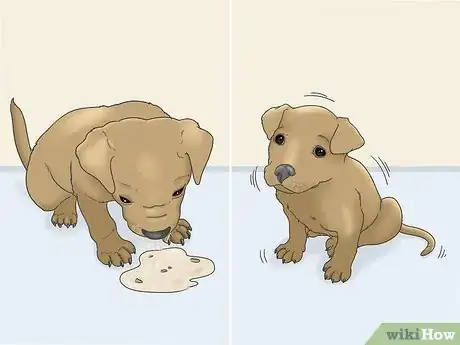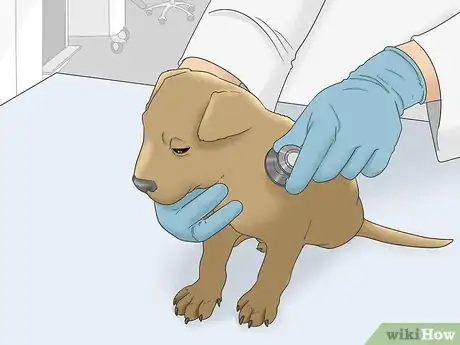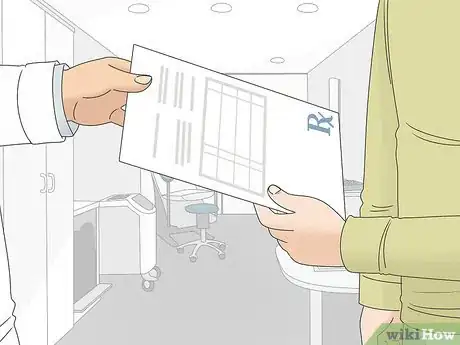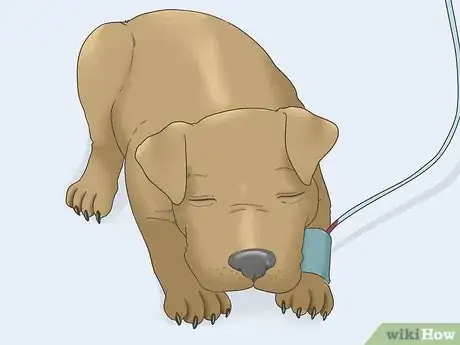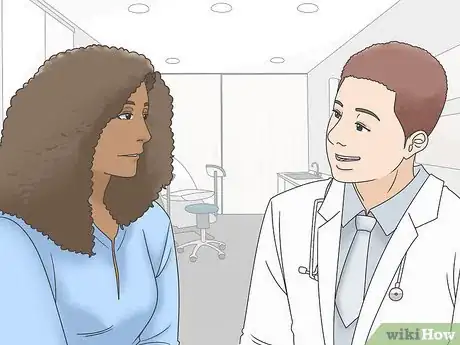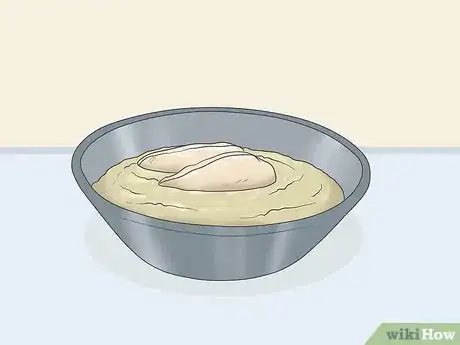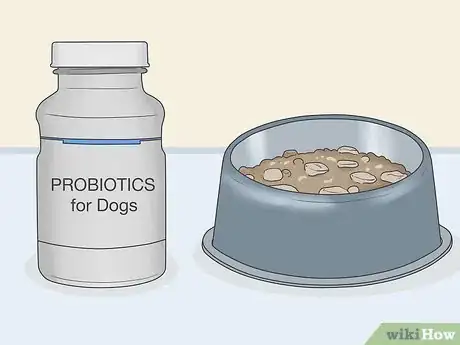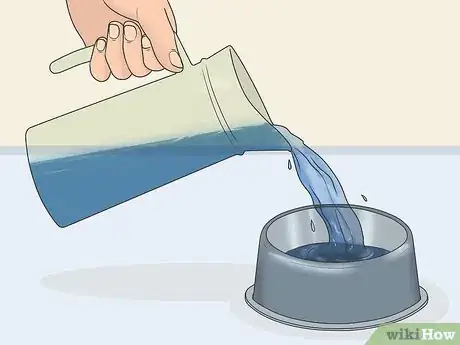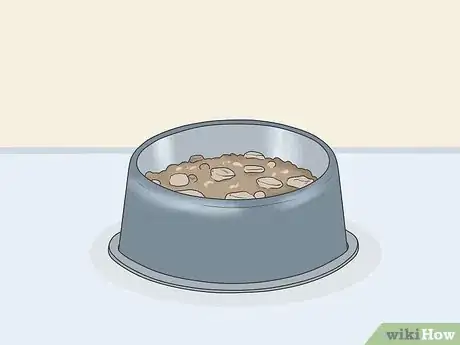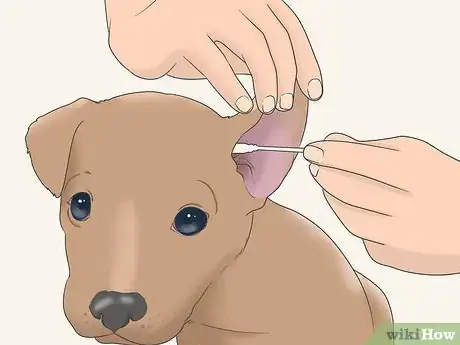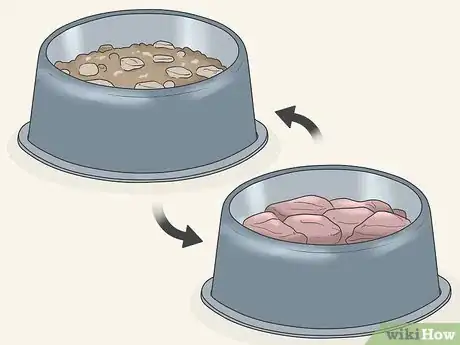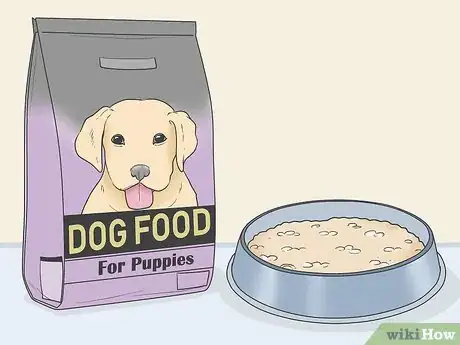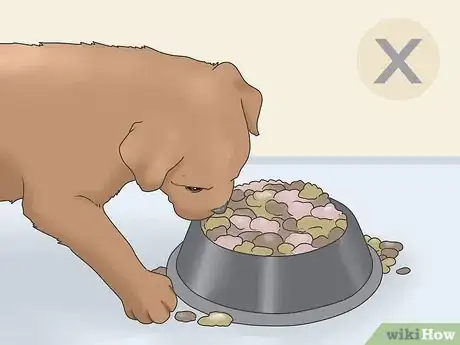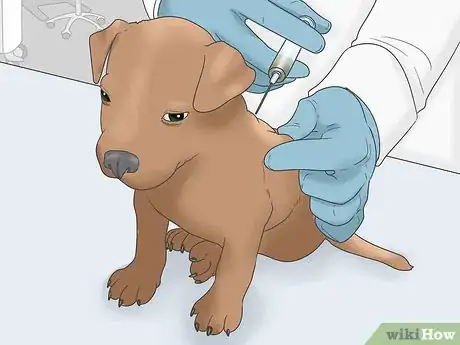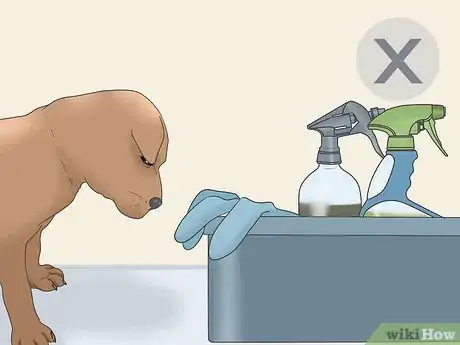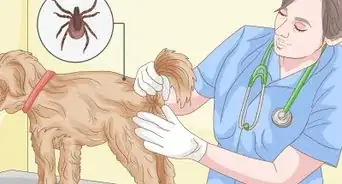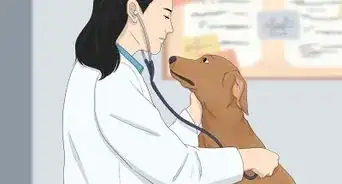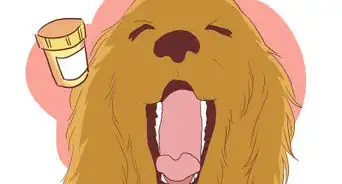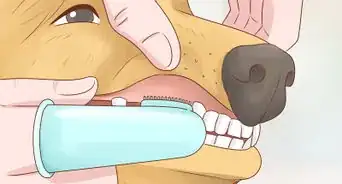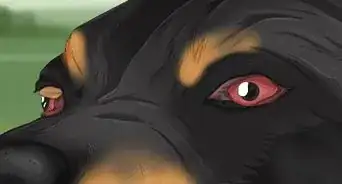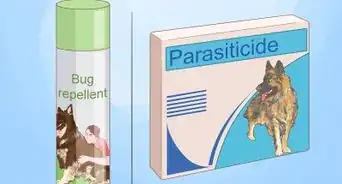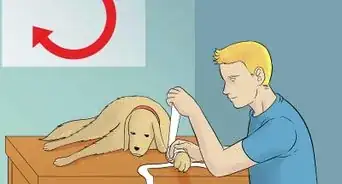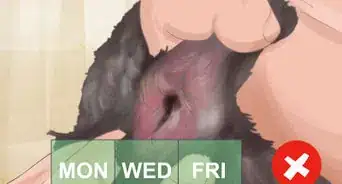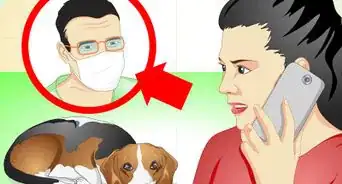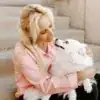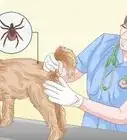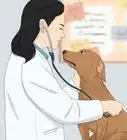This article was co-authored by Natalie Punt, DVM and by wikiHow staff writer, Kyle Hall. Dr. Natalie Punt is a Veterinarian and the Founder and CEO of mPet- a smart phone app for pet owners to store, manage and transfer their pets medical records and health information. She specializes in small animal emergency and general medicine and veterinary practice economics. Dr. Punt holds a BS in Biochemistry and Molecular Biology from The University of California, Davis, an MS in Biochemistry from The University at Buffalo, and a DVM from Western University of Health Sciences.
There are 7 references cited in this article, which can be found at the bottom of the page.
This article has been viewed 16,316 times.
If your puppy has diarrhea, it's important to take the problem seriously. You'll want to reduce your puppy's symptoms quickly and get it professional veterinary care. With proper care at home and in the veterinary office, you can eliminate the puppy's symptoms and treat the underlying cause of the diarrhea.
Steps
Getting Veterinary Treatment For Your Puppy
-
1Contact your veterinarian if your puppy has severe diarrhea. Since puppies are delicate animals, they should get veterinary care if they have diarrhea for longer than a day, they seem unwell, or they're not eating. The dehydration and illness that is associated with diarrhea can threaten their young lives if it goes on too long. Also, if your puppy is having a bout of uncontrollable diarrhea and is going to the bathroom while it walks around, then you need to get it veterinary care right away. Additional symptoms that signal that your puppy has an extreme case that needs immediate veterinary care include:[1]
- Bloody feces
- Black or tarry feces
- Fever
- Pale gums
- Discomfort or pain
- Vomiting
- If your puppy has diarrhea and hasn't gotten all of its shots yet, as diarrhea can signal parvovirus
- If you suspect the puppy has swallowed a foreign body or toxic substance
Tip: If your veterinary office isn't open, such as is often the case on the weekend, take your puppy to an emergency veterinary hospital.
-
2Get veterinary testing done. After your vet does a physical exam and discusses your puppy's symptoms with you, they may want to do some additional testing. In order to find the cause of the diarrhea, they are likely to do blood or feces tests. Allow these tests to be done so that your vet can figure out what is causing the diarrhea. It's important to treat the underlying condition causing the diarrhea, in addition to managing the symptom.[2]
- Feces tests can help the vet identify a parasitic infection, such as giardia.
- A blood test can help the vet find bacterial or viral causes for diarrhea, as well as poisons or toxins that your puppy has gotten into.
Advertisement -
3Follow your veterinarian's suggestions for home treatment. Once your vet tells you what is causing your puppy's diarrhea, they will give you their plan for treatment. This treatment plan will vary greatly depending on the cause of your puppy's diarrhea:
- If your puppy has a bacterial infection, it's likely that your veterinarian will prescribe antibiotics.[3]
- If parasites are the cause of the diarrhea, your puppy will need to take an anti-parasitic medication to eliminate them.
- In minor cases of diarrhea that are caused by changes in diet or eating too much, your veterinarian may just suggest that you put your puppy on a bland diet and keep it hydrated until the condition clears up.
-
4Have your puppy hospitalized if your vet suggests it. If your puppy has a serious illness or infection, it may need constant care to recover from it. In the hospital your puppy can get intravenous fluids and medication, emergency medical care if its condition deteriorates, and it will be watched closely by veterinary staff.[4]
- It is common for puppies to need intravenous fluids when they are coping with diarrhea. Their bodies are small and can become severely dehydrated very quickly.
- There are a variety of very serious conditions that can make your puppy fatally ill very quickly, the most common of which is parvo virus. Without quick treatment in a veterinary hospital, parvo will be fatal for a puppy.[5]
Giving Care at Home
-
1Talk to your vet about giving the puppy an over-the-counter medication. Many of the diarrhea medications made for people, and special diarrhea medications made for dogs, can help a puppy's symptoms. However, talk to your vet before giving one of these medications to your puppy so that you know which product to use and how much to give to your puppy.[6]
- If your veterinary office isn't open, contact an emergency veterinary hospital about what to give your puppy.
-
2Put your puppy on a bland diet. Since your puppy's digestive system is not working well, bland foods can help it reset while still giving your puppy proper nutrition. Feed the puppy small amounts of food 4-6 times a day so that it gets proper nutrition but the diarrhea doesn't worsen. Feed your puppy a combination of these foods until the diarrhea stops:[7]
- Cooked white rice
- Cooked boneless, skinless chicken
- Canned pumpkin
- Boiled, skinless potatoes
- Scrambled eggs, cooked with no fat
Tip: Talk to your veterinarian about what foods might be best for your particular dog and how much you should give it.
-
3Add dog probiotics to your puppy's meals. Diarrhea can cause an imbalance to your puppy's gut bacteria. Fortunately, dog probiotics can help restore a healthy gut. Look for dog probiotics at your local pet store or ask your vet for them. Then, follow the directions on the package to add the probiotics to your puppy's food.[8]
- For instance, Purina Fortiflora canine and Promax are great options for dog probiotics.
- Don't give your dog probiotics meant for humans. Their gut bacteria are different, so they need a product that's formulated for dogs.
-
4Provide constant access to clean drinking water. Diarrhea can dehydrate a puppy very quickly, which can be extremely dangerous for their health. To help avoid this, put out a bowl of clean water close to your puppy so that it can easily drink.[9]
- You can also put a small amount of water on your puppy's meals so that it gets water while eating.
- Although some people reduce a puppy's access to water in the evening, so that it doesn't urinate in the night, if your puppy has diarrhea, you shouldn't restrict access to water at all.
Warning: Don't give your dog milk because many dogs can't digest lactose, which is the sugar in milk. This means milk can cause diarrhea in your puppy.
-
5Do not withhold food, as you might do with an older dog. When treating a grown dog for diarrhea, it can be effective to withhold food for 24 hours to let their digestive system reset and clear out whatever is upsetting it. However, a puppy needs constant nutrients because it doesn't have the reserves that an older dog has. You need to continue to feed your puppy, just with a diet that is very easy to digest.[10]
-
6Keep your puppy clean and comfortable. It can be really uncomfortable and tiring for a puppy to have diarrhea, so make sure it's being kept warm and cozy so that it can rest when necessary. Also, wipe down its rear end when necessary, as it's important for the puppy's health to stay clean.
- If your puppy's anus gets sore from wiping, apply a barrier cream to the anal area so that it feels better. For instance, apply F10 cream for dogs to soothe the skin. However, don't apply any products made for humans because they may contain zinc, which is toxic to your puppy if it licks off the cream.
-
7Change your puppy's diet if you can't find other causes of diarrhea. Some cases of diarrhea are caused by an allergy to an ingredient in your puppy's food. If you have eliminated other possible causes, gradually switch your puppy's diet to one with fewer potential allergens.[11]
- Talk to your vet about what diet might be best for your puppy. They are likely to suggest a higher quality food that has fewer ingredients than the one you have been feeding your dog.
Preventing Cases of Diarrhea
-
1Keep your puppy's diet consistent. One of the most common causes of diarrhea in puppies is when their food is changed abruptly. Buy the same exact food each time and feed them the same amount every day.[12]
- Even if two food brands have similar ingredients, it's likely that they will be different enough to upset your puppy's stomach.
- If you need to change the type or brand, change it gradually. This will allow your puppy's digestive system to get used to new food without shutting down.
-
2Avoid giving your puppy rich treats or excess food. While it may be tempting to give your puppy table scraps or special treats, rich or unusual foods can hurt your puppy's digestive system. Instead, only give your puppy its puppy diet so that it's digestive system doesn't get off track.
- However, you can give your puppy commercial training treats that are made specifically for puppies. These treats are low in calories and are typically safe for a puppy's digestive tract.
Tip: Sometimes puppies get into food or trash that they shouldn't and they eat way more than they can handle. If you discover that your puppy has gotten into food that it shouldn't expect that a case of diarrhea is likely to follow.
-
3Have your puppy vaccinated for parasites and viruses. There are a variety of common parasites and viruses that can cause your puppy to get diarrhea, including parvovirus and distemper. It's important to get your puppy vaccinated for these common illnesses as soon as you can, so that it doesn't get one of these illnesses.
- Your vet will let you know when your puppy is old enough to get specific vaccinations. The age varies depending on the specific vaccination, but most are given to puppies when they are between 8 weeks and 12 months old.[13]
-
4Keep your puppy away from poisonous substances. Some cases of diarrhea are caused by ingesting toxic or poisonous substances, such as cleaning products. To avoid this, keep all chemicals locked away where your puppy can't get to them.[14]
- If your puppy does get into a chemical, call your veterinarian immediately to let them know you are bringing in your puppy and get it veterinary care right away.
Expert Q&A
-
QuestionCan dog treats give puppies diarrhea?
 Natalie Punt, DVMDr. Natalie Punt is a Veterinarian and the Founder and CEO of mPet- a smart phone app for pet owners to store, manage and transfer their pets medical records and health information. She specializes in small animal emergency and general medicine and veterinary practice economics. Dr. Punt holds a BS in Biochemistry and Molecular Biology from The University of California, Davis, an MS in Biochemistry from The University at Buffalo, and a DVM from Western University of Health Sciences.
Natalie Punt, DVMDr. Natalie Punt is a Veterinarian and the Founder and CEO of mPet- a smart phone app for pet owners to store, manage and transfer their pets medical records and health information. She specializes in small animal emergency and general medicine and veterinary practice economics. Dr. Punt holds a BS in Biochemistry and Molecular Biology from The University of California, Davis, an MS in Biochemistry from The University at Buffalo, and a DVM from Western University of Health Sciences.
Veterinarian Absolutely—especially if they're high in fat (like peanut butter). So, if you give a puppy with a sensitive stomach or intestinal parasites a really high-fat treat, it'll likely develop bad diarrhea.
Absolutely—especially if they're high in fat (like peanut butter). So, if you give a puppy with a sensitive stomach or intestinal parasites a really high-fat treat, it'll likely develop bad diarrhea.
Expert Interview
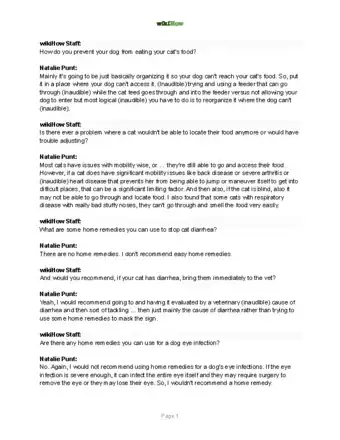
Thanks for reading our article! If you'd like to learn more about dogs' health, check out our in-depth interview with Natalie Punt, DVM.
References
- ↑ https://www.akc.org/expert-advice/health/puppy-diarrhea/
- ↑ https://www.akc.org/expert-advice/health/puppy-diarrhea/
- ↑ https://www.akc.org/expert-advice/health/puppy-diarrhea/
- ↑ https://www.akc.org/expert-advice/health/puppy-diarrhea/
- ↑ https://www.akc.org/expert-advice/health/parvo-in-dogs/
- ↑ https://www.petcarerx.com/article/how-to-get-rid-of-diarrhea-in-puppies/1485
- ↑ https://www.akc.org/expert-advice/health/doggie-diarrhea/
- ↑ https://www.petcarerx.com/article/how-to-get-rid-of-diarrhea-in-puppies/1485
- ↑ https://www.akc.org/expert-advice/health/doggie-diarrhea/
- ↑ https://www.akc.org/expert-advice/health/doggie-diarrhea/
- ↑ https://www.merckvetmanual.com/management-and-nutrition/nutrition-small-animals/nutrition-in-disease-management-in-small-animals?query=puppy%20diarrhea
- ↑ https://www.caninejournal.com/changing-dog-food/
- ↑ https://www.akc.org/expert-advice/health/puppy-shots-complete-guide/
- ↑ https://www.akc.org/expert-advice/health/puppy-diarrhea/
